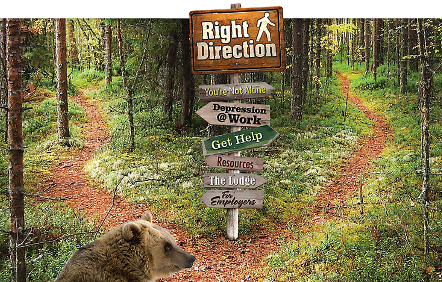Workers Pointed In ‘Right Direction’ for Depression Care
Abstract
An innovative intervention enters the workplace wilderness to seek out hidden depression and bring into treatment those who live with the illness.

Depression can feel like you're lost in the woods, but help is available. That’s the concept behind a new campaign from the Partnership for Workplace Mental Health and the Employers Health Coalition.
Depression has suggested many metaphors over the years. Now comes the turn of a large brown bear with a rep tie.
A coalition of 300 major U.S. employers along with the American Psychiatric Foundation’s (APF) Partnership for Workplace Mental Health has launched a new initiative—“Right Direction”—to increase employees’ understanding of depression’s debilitating effects and encourage those who need care to seek it. The concept behind the initiative is that having depression can make one feel lost and alone in the wilderness, hence the bear who finds himself in all types of workplace scenes.
Depression matters to employers because of the prevalence of the condition and its impact on productivity, with annual productivity losses estimated at about $44 billion.
“Our goals are to increase awareness of depression, reduce stigma, and encourage employees who might be depressed to seek help,” said Marcas Miles, M.A., director of programs, communications, and community initiatives at Employers Health Coalitionin Canton, Ohio. The national coalition oversees corporate group purchases of pharmacy benefits and other services.
The campaign includes an evaluation component, which will be led by Debra Lerner, Ph.D., M.S., a professor at Tufts University School of Medicine.
“Our goal will be to figure out if the program is being used, who uses it, how they use it, and if it has an impact,” said Lerner, who is also director of the Program on Health, Work, and Productivity at the Tufts Institute for Clinical Research and Health Policy Studies. Lerner has conducted research on other workplace intervention programs targeting depression.
“Right Direction is an organizational-level effort to raise awareness and educate employees,” noted Lerner. “We will look at variables like the numbers screened and treated, but also try to get harder-to-find data on work performance.”
Right Direction deploys the tools of modern business, mainly delivered over the Web, to inform human resources personnel and then all employees about depression. These include a Web site, posters, e-mails, and PowerPoint slides. The PHQ-9 serves as a self-administered screening instrument.
The material informs employees about the symptoms of depression and how they are manifested in the workplace, said Clare Miller, director of APF’s Partnership for Workplace Mental Health. One message that employees will receive, for example, explains how “reduced interest, low motivation, slowed thoughts, and difficulty making decisions can result in poorer-quality work.” Employees are urged to seek help for themselves or their families through medical professionals and their employee-assistance program.
The human resources managers at the corporations that make up Employers Health Coalition and the partnership are now reviewing Right Direction material and planning ways to communicate the information to workers and to integrate the campaign with existing employee-assistance programs and programs of insurers, Miller told Psychiatric News.
Several companies will spend the next few months laying this groundwork, then roll out the full campaign during Mental Health Awareness Week in October, said Miles.
If they do, they might make clear to their employees that the burden of depression needn’t be, well, unbearable.
Right Direction, a program of APF’s Partnership for Workplace Mental Health and the Employers Health Coalition, is supported by Takeda Pharmaceuticals U.S.A. Inc. and Lundbeck U.S. ■
Information about the Right Direction campaign is posted at http://www.rightdirectionforme.com.



